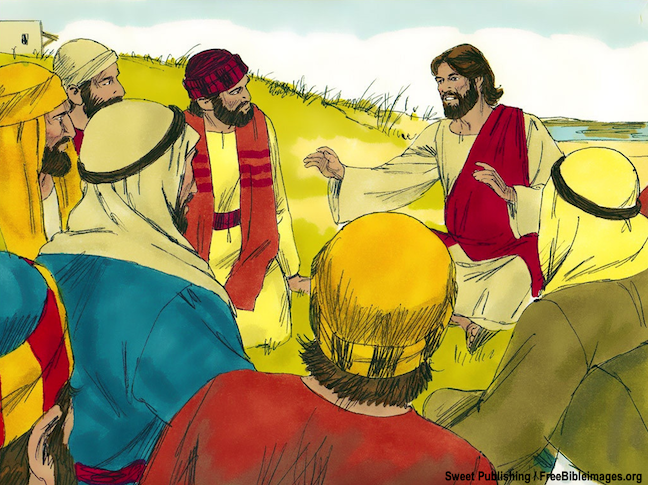“In this the love of God was manifested toward us, that God has sent His only begotten Son into the world, that we might live through Him.” I John 4:9
In 1966 Dionne Warwick made an album that included a song that would become very famous – “What the world needs now, is love, sweet love, it’s the only thing there is just too little of.” Fifty-seven years later I don’t think anything has changed. In this war-torn world of terrorism and fear, a little love would go a long way. And its not just the world and nations that need love. I believe more than ever that Christians also need love – lots of love.
But what is love? Listen to the answers of some four- to eight-year-olds: 1
1. “When my grandmother got arthritis, she couldn’t bend over and paint her toenails anymore… So, my grandfather does it for her all the time, even when his hands got arthritis too. That’s love.” Rebecca (Age 8)
2. “Love is when a girl puts on perfume and a boy puts on shaving cologne and they go out and smell each other.” Karl (Age 5)
3. “Love is what makes you smile when you’re tired.” Terri (Age 4)
4. “Love is when you tell a guy you like his shirt, then he wears it every day.” Noelle (Age 7)
5. “Love is when Mommy sees Daddy smelly and sweaty and still says he is handsomer than Robert Redford.” Chris (Age 7)
6. “When you love somebody, your eyelashes go up and down and little stars come out of you.” Karen (Age 7)
7. “Love is when your puppy licks your face even after you left him alone all day.” Mary Ann (Age 4)
8. “Love is like a little old woman and a little old man who are still friends even after they know each other so well.” Tommy (Age 6)
After talking about how God’s Spirit can enable believers to discern the spirit of truth from the spirit of error in the world today (3:24-4:6), the apostle John will now focus on how God’s Spirit can manifest His love in our relationships with one another (4:7-11).
We cannot give what we do not have. Many people today have grown up in homes where they talked about love, but they did not experience unconditional love. As they have grown up, they find it very difficult to love unconditionally if they have never received this kind of love.
We must receive love before we can give it. How do we do this? Where do we find this kind of love? You don’t find it in humans or angels or animals. It comes from God, and He wants to share it with us, so we can share it with others.
Let’s remember that the apostle John was the youngest and closest of Jesus’ twelve disciples. He discovered that Jesus, the Messiah was magnetic (1:1-2). Christ draws us closer and closer to Himself. This is the experience John had with Jesus. And he wants his readers to enjoy an increasing intimacy with Jesus by practicing righteousness as God is righteous (2:29-3:10a) and by loving one another as God is love (3:10b-3:23; 4:7-21).
Towards the end of his life, love is practically all that John can talk and think about. By the time John writes this letter, he has learned that relationships are really all that matters. The toys, the titles, and trophies we collect don’t really matter; but relationships do.
John writes, “Beloved, let us love one another, for love is of God; and everyone who loves is born of God and knows God.” (I John 4:7). John includes himself when he says, “let us love one another.” Just as confessing that Jesus Christ has come in the flesh demonstrates that one is “of God” (4:2), so does loving one another, “for love is of God” (4:7a). 2 Something has happened to John. He has become obsessed with love because he has experienced God’s love in such a life-changing way.
What does this have to do with you and me? Everything. Most of us long to be loved, but we don’t know how to get it. Many of us long to give love, but we keep sabotaging our own efforts and making things worse. Like the husband who sought marriage counseling with his wife as a last resort to save their marriage. When they arrived at the counselor’s office, the counselor jumped right in and said, “What seems to be the problem?”
For the next fifteen minutes the wife talks 90 MPH about all the problems in their marriage while the husband just sits there with nothing to say. The counselor then goes over to the wife, picks her up by her shoulders, kisses her passionately and sets her back down. The wife sits there speechless. The marriage counselor looks over at the husband, who is staring in disbelief, and says to him, “Your wife needs that at least twice a week!” The husband scratches his head and replies, “I can have her here on Tuesdays and Thursdays.” We cannot give what we do not have.
The apostle John wants his readers to become more Christlike by loving one another as Jesus loves them. How does this happen? If we are to share God’s love with others, we must first receive God’s love for ourselves. The more we know God, the better we will love people.
John writes, “7bAnd everyone who loves is born of God and knows God. 8 He who does not love does not know God, for God is love.” (4:7b-8). John says, “God is love.” We cannot give what we do not have. God is love. If we have Him, we have love. If we do not have Him, we only think we have love because God not only cornered the market on love, He IS the market on love.
The person who has this kind of love is “born of God and knows God” (4:7b). The phrase “born of God” refers to new birth. The reason he or she must be “born of God” is because this kind of love is sourced in God (“for love is of God” – 4:7a). The non-Christian cannot produce this kind of love. 3 Before we can ever produce this kind of love in our lives, we must first be born of God. How? The Bible says you must simply believe in Jesus Christ: “Whoever believes that Jesus is the Christ is born of God.” (I John 5:1). To believe “Jesus is the Christ” is to believe that He is the promised Messiah-God (“Christ”) Who guarantees a future resurrection and never-ending life to all who believe in Him (cf. John 11:25-27).
In John 14:6, Jesus says, “I am the way, the truth, and the life. No one comes to the Father except through Me.” Jesus makes it very clear that there is only one way to God and that is through Him. Our sin, the wrong things we have done, separate us from God (Rom. 3:23; 6:23). This separation from God causes problems in every area of our lives – including our relationships. But Jesus has provided the only way back to God by dying on the cross for our sins and rising from the dead (I Cor. 15:3-6). The Lord Jesus now invites you to believe or trust in Him alone for eternal life. Christ said, “He who believes in Me has everlasting life” (John 6:47). It doesn’t matter how badly you have messed things up, you can come to Christ just as you are.
How many of you drive to work? Just as you trusted your vehicle to bring you to your workplace, so you must place your trust in Jesus Christ alone to give you eternal life. The good things you have done will not save you. Only Jesus can save you from your sins. The moment you place your trust in Jesus for eternal life, you become God’s child and God comes to live inside of you and love you always (John 1:12; 14:16-17; Romans 5:5). As you get to know Him and trust Him, He pours His love into your life so you can begin to love others.
Some of you are reading this today and you are ready to receive God’s love, aren’t you? Simply believe Jesus’ promise in John 6:47, “He who believes in Me has everlasting life.” Are you convinced Jesus was speaking the truth here and is therefore worthy of your trust? If so, you now have eternal life and Christ now lives inside you through His Holy Spirit.
If we are going to develop loving relationships, we must also refill ourselves. John said everyone who loves God’s way is “born of God and knows God” (4:7b). Once we have begun a relationship with God through faith in Jesus, it is important to stay close to Him and get to “know” Him. This is more than salvation; it is fellowship or closeness with God (cf. 2:3-5).
“Love stems from a regenerate nature and also from fellowship with God which issues in knowing Him (see 2:3-5).” 4
Notice that John says, “He who does not love does not know God, for God is love” (4:8). He does not say the absence of love means a person is not born of God. It would have been easy for him to say this if that was true. But he does not because the absence of love is evidence he “does not know God, for God is love.” Since “God is love,” those who abide in Him or know Him intimately (2:3-5) will manifest His loving character (4:7-8). Since “God is light” (1:5), those who abide in Him will walk in His light and manifest His holy character (1:7). Since God “is righteous” (2:29a), those who abide in Him practice righteousness (2:29b). 5
In I John 2:3-11, “John used the word ‘know’ in the sense of intimacy with God. Here he comes back to the same thought. A person can be born of God but quenching the Spirit. He could be walking in darkness. If so, he is quenching the Spirit, not walking with the Spirit, and therefore not enjoying the fruit of the Spirit like love and joy. If this is true of him, we can certainly say he is not close/intimate with God. He does not know God in this intimate sense, as we have discussed previously. So, the person who exercises agapē love has a relationship with and fellowship with God. The person who does not exercise agapē love might be a person who has a relationship with God but no fellowship with Him. It’s true that a person who lacks this kind of love might be an unbeliever, since unbelievers cannot produce this kind of love, but just to observe that a person is not exercising this kind of love does not prove he is an unbeliever. He could be a believer out of fellowship.” 6
“Fellowship with God is demonstrated and attained when Christians love each other. If love is from God, then there is no option. We must love one another (4:7). This is not rocket science. Since God is love, an absence of love in your life reveals an absence of fellowship with God. It indicates that you don’t know Him like you claim you do (4:8). As sure as the magnetic pull of the earth causes a compass to point north, the magnetic pull of God’s love at work in your heart will always point you to other brothers and sisters who need love.” 7
Staying close to God is not complicated. Picture your life as a bucket. You must have your bucket filled. And God’s love is like a fountain. The more you refill that bucket, the more love you will have to share with others. If you have been a Christian for a while, you can probably tell when your bucket is empty. You are easily irritated or angered. It’s hard to let go of past hurts, to trust him or her again, to expect the best of him or her. Perhaps you can’t stand being in the same room with the person. All of these are indications that you need to be refilled.
You ask, “How do I do it?” Spend time with Jesus. Hang out with Him. Read what He has written in the Bible. Talk to Him about what you are reading and feeling. Treat Him like a close friend, and you’ll become a close friend. And when you get closer to Jesus, you will discover that you are more able to love those who matter to you. Come to church every week so you can hang out with the people who hang out with God. Join a small group where you can hang out more intimately with a few of God’s friends.
Can you see this? Is this making sense? Can you see why you need God’s love to love others? Some of you may be saying to yourselves, “Okay, so God commands us to love one another, but what does God’s love look like?” John gives us a beautiful picture of God’s love in the following verses.
“9 In this the love of God was manifested toward us, that God has sent His only begotten Son into the world, that we might live through Him. 10 In this is love, not that we loved God, but that He loved us and sent His Son to be the propitiation for our sins.” (I John 4:9-10). John tells us several things about God’s love:
1. God’s love is visible. “The love of God was manifested toward us” (4:9a). The Greek word translated “manifested” (phaneroō) means to “become visible, reveal, make known.” 8 God’s love is not invisible. It can be known and seen. Love that is invisible is no love at all. 9
2. God’s love is volitional. “God sent” (4:9b). God the Father chose to send His Son to earth.His love involves an act of the will. It is not a feeling. If the Father waited to feel like sending His Son to suffer and die on our behalf, He would still be waiting. To love like God loves involves a decision to act on another’s behalf; 10 to do what is best for another person.
3. God’s love is selfless. “God has sent His only begotten Son” (4:9c). His love gives without expecting anything in return. Often, we give to get. That is not God’s love. If Jesus had been selfish, He would never have left heaven or if He had come to earth, He would have packed His bags and left at the first sign of rejection. But He didn’t. He endured incredible suffering because He came to give, not to get. If God’s love is controlling our lives, we will be givers, not getters.
4. God’s love is sacrificial. “God has sent His only begotten Son into the world” (4:9c). He not only gives, but He gives sacrificially. God’s love cost Him “His only begotten Son.” The Father did not give us His leftovers; He provided His very best. 11 Why? “That we might live through Him” (4:9d). Christ sacrificed Himself on the cross for our sins so we might “live” eternally with Him in heaven in the future (John 10:10b; 3:16; 14:2-3) and abundantly with Him on earth now (John 10:10c).
Anderson writes, “I remember the story of the little girl who had just memorized John 3:16. She asked her father, ‘If God loved the world so much, why didn’t He offer Himself? Why did He send His Son?’ For a moment the father was stumped. Then it dawned on him. ‘Well, honey, think how much more love it took for God to send His Son than to offer Himself. It would be much easier for me to sacrifice my own life for a good cause than to sacrifice you, my only daughter.’” 12
Jesus “saw our deepest need and gave of Himself. If you profess love without also embracing inconvenience and being willing to give up your rights, you don’t understand God’s love.” 13
5. God’s love serves the unlovable. 14 “In this is love, not that we loved God, but that He loved us” (4:10a). God’s love was not a response to our love. Before we came to Christ, we were His enemies (Rom. 5:10a). We rebelled against Him (Isaiah 53:6). We chose our own way instead of His. Yet Jesus set His love on us and pursued us to save us (Luke 19:10). He loved us even if we never loved Him back. God loves us when our walk of faith is weak or when it is strong. He sticks with us in the good times and the bad. Nothing about us makes Christ love us. He loves us because it is His nature to love. If God waited for us to love Him first, He would still be waiting. Thank God that He loved you and me first. His love does not require that you love Him back.
God calls us to love people who won’t respond in kind. But they need our love, nonetheless. The Lord wants to love our spouses or children even if they do not love us back. He calls us to love the person at work or the neighbor living next to us who never responds in kind to our love for them. Is this easy? Definitely not! But it is possible through Christ.
6. God’s love addresses sin. “He loved us and sent His Son to be the propitiation for our sins” (4:10b). The word “propitiation” (hilasmos) means “appeasement” or “expiation.” 15 Propitiation refers to the satisfaction God the Father felt when Jesus paid the penalty for all our sins (John 19:30). What should Christ’s death on the cross shout loud and clear? “God is satisfied with His Son’s payment for our sins!”
The story is told of two boys who were swimming in the lake. One of the boys went out too far, got in trouble, and began to sink. The second boy, seeing his friend in trouble, swam out to save him. He was able to keep the first boy afloat until help arrived, but in the process became exhausted and sank beneath the water. He drowned saving his friend.
Later that day, the parents of the boy who was saved came to the parents of the boy who died saving their son and said, “All we have on us right now is a dollar and eighty-three cents. We know it isn’t much, but we hope you’ll accept this as our payment to you for the life of our son.”
Now if you were the parents who had lost their son, how would you feel? I think you would feel terribly offended and insulted. But this is the way we appear to God when we try to offer Him our acts of human goodness as payment for our sins. Nothing we can offer God will ever begin to make up for what it cost Him to save us. Let’s not insult God by offering Him our $1.83 when He has given us His precious Son. The cost of our redemption is infinitely high. 16
We must be satisfied with what satisfied God the Father – His Son’s payment for all our sins. We must believe or trust in Christ alone to give us eternal life.
Earlier in I John we looked at expressing God’s love by meeting the physical needs of a Christian brother or sister (3:17-18). But here John reminds us that God’s love also addresses the spiritual needs of others. Only Christ can save people from the penalty of their sins forever, but that does not mean we are to ignore sin in the body of Christ 17 or in the lives of non-Christians. With humility and love, God’s love calls us to help those caught in sin. If they are nonbelievers, we are to share the gospel with them so they may believe in Christ and be forever saved from the penalty of their sins (Acts 16:31) and then learn to overcome sin by abiding in Christ (I John 2:3-6). If they are believers in Jesus, we are to come alongside of them to help them be restored to fellowship with Christ (Gal. 6:1).
Thirdly, in addition to receiving God’s love and being refilled with His love, we are to reflect His love to others. “Beloved, if God so loved us, we also ought to love one another.” (I John 4:11). In other words, if God loved us with this visible, volitional, selfless, sacrificial, serving, and satisfying love when we were least deserving, then we ought to love each other in the same way. Maybe our love cannot be as perfect as Jesus’ love, but it can grow in that direction. This is to be our goal.
When we experience God’s amazing love, we will naturally want to share that love with the people we love. Forty-fours years ago this month, God’s love changed my life and I have been sharing my story ever since.
We love because He first loved us (I John 4:19). We cannot give what we do not have, but once we have received God’s love, if we stay close to Him, we just get better and better at loving people.
If you are reading this article and you conclude that it is impossible for you to love the way God has loved us, please do not stop reading. Perhaps you have wounded your spouse or friend, and they have closed their heart off toward you. Do you realize that if you receive God’s love today by believing or trusting in Christ alone for His gift of eternal life, you will be able to be a better spouse or friend because God comes to live inside of you to love others through you? You have never been able to be a better spouse or friend than you are today if you receive Christ.
Receiving God’s love requires faith and humility on your part. Faith to believe that God will really love you and give you eternal life, and humility to admit that He is God, and you are not. Jesus said, “Whoever believes in Him should not perish but have everlasting life.” (John 3:16b). Are you depending on Jesus alone for everlasting life? If yes, then congratulations, because you now have everlasting life and can experience God’s love everyday. You can now tell God through prayer what you have done. Remember that saying a prayer does not take us to heaven. Only believing or trusting in Christ alone does.
Prayer: Dear God, I need Your love in my life. I understand now that You loved me by sending Your Son to take my place and punishment when He died on the cross for my sins and rose from the dead. I am now believing or trusting in Jesus alone (not my good life, prayers, or religion) to give me the gift of everlasting life. Thank You for the everlasting life I just received. In Jesus’ name. Amen.
When you believed in Christ for His gift of eternal life, He came to live inside you through His Holy Spirit so that Christ now lives in and through you (John 1:12; Rom. 5:5; Gal. 2:20). With Christ living in you, you can ask Him to love others through you. Think of the person you have the hardest time loving. It may be your spouse, your child, or someone you work with. It could be someone who has hurt you deeply, but who needs the Lord. After you think of this person, you can offer this prayer in faith to the Lord.
Prayer: Lord Jesus, You know I feel no love for this person. You know that in my flesh, I have already rejected this person. Lord, You know the truth. You know that without Your help, I can’t forgive or love this person. But I know You love my enemy, so right now I give You permission to express Your love and forgiveness for this person through me. I can’t do this myself, but I’m going to trust You to love this person through me. In Your mighty name, I pray Lord Jesus. Amen.
Once you start really living like this, putting faith ahead of feelings, things are going to start happening. You are going to see God do things in your life you didn’t think possible. But let me caution you, it may feel awkward at first if you are not used to living by faith. But that’s okay, because we can get comfortable doing things we felt awkward doing at first (e.g., riding a bicycle, etc.).
ENDNOTES:
1. Adapted from Matt Hogan’s blog entitled, “20 Love Quotes From 4–8-Year-Old Kids (That Will Shock You)” at movemequotes.com.
2. Zane C. Hodges, The Bible Knowledge Commentary Epistles and Prophecy, Editors John F. Walvoord and Roy B. Zuck (David C. Cook, 2018 Kindle Edition), Kindle Location 3956.
3. David R. Anderson, Maximum Joy: I John – Relationship or Fellowship? (Grace Theology Press, 2013 Kindle Edition), pg. 200.
4. Hodges, The Bible Knowledge Commentary Epistles and Prophecy, Kindle Location 3961.
5. Tom Constable, Dr. Constable’s Notes on 1 John, 2022 Edition, pg. 96.
6. Anderson, Maximum Joy, pp. 200-201.
7. Tony Evans, CSB Bibles by Holman, The Tony Evans Bible Commentary (B & H Publishing Group, Kindle Edition, 2019), pg. 2947.
8. Walter Bauer, A Greek-English Lexicon of the New Testament and Other Early Christian Literature: Third Edition (BDAG) revised and edited by Frederick William Danker (Chicago: University of Chicago Press, 2000 Kindle Edition), pg. 1048.
9. Evans, The Tony Evans Bible Commentary, pg. 2947.
10. Ibid.
11. Ibid., pp. 2947-2948.
12. Anderson, Maximum Joy, pg. 203.
13. Evans, The Tony Evans Bible Commentary, pg. 2948.
14. Ibid.
15. Bauer, A Greek-English Lexicon of the New Testament, pg. 474.
16. R. Larry Moyer, Show Me How To Illustrate Evangelistic Sermons (Grand Rapids: Kregel Publications, 2012), pp. 211-212 cites Dr. Tony Evans, Totally Saved.
17. Evans, The Tony Evans Bible Commentary, pg. 2948.










